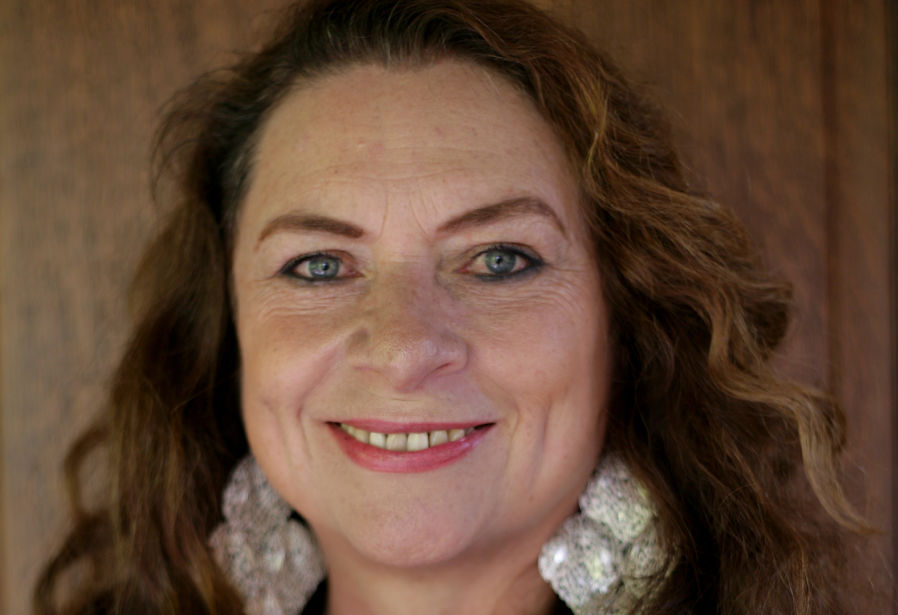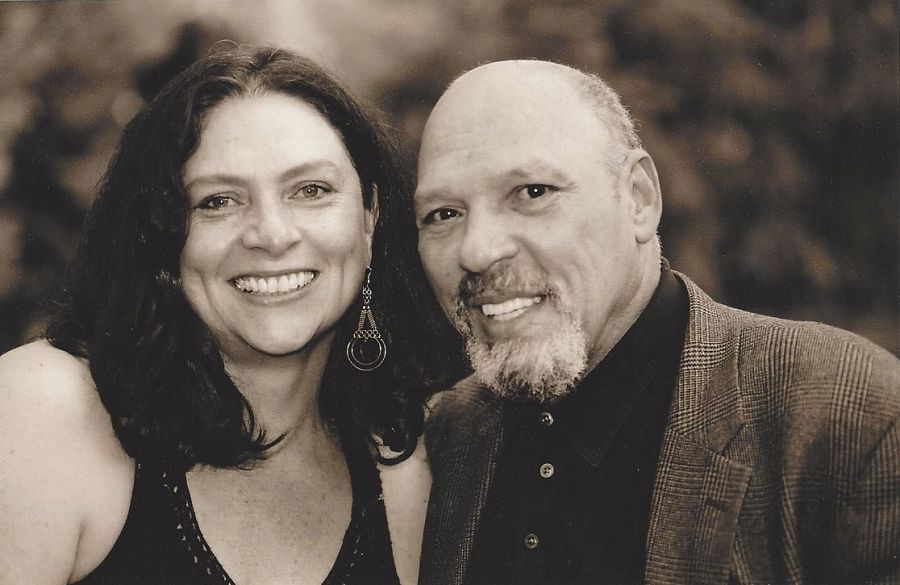Constanza Romero can thank her teachers at the Yale School of Drama, which she attended briefly in the late 1980s, for helping to shape her destiny: It was they who assigned her to design costumes on the world premiere of August Wilson’s The Piano Lesson at Yale Repertory Theatre. Thus began a professional and romantic partnership that lasted until Wilson’s death in 2005.
Romero, who lives in Seattle, was in New York City recently for the finals of the August Wilson Monologue Competition and other Wilson business. She took some time to sit down and talk with American Theatre about legacy of “The Ground on Which I Stand,” the state of the Wilson estate, and the capaciousness of his signature 10-play cycle.
ROB WEINERT-KENDT: I had the privilege of interviewing your husband when he was working on Jitney at the Taper in L.A. I was a little intimidated at first, but I found him to be an extremely friendly, approachable theatre guy who liked to talk about it.
CONSTANZA ROMERO: He was very generous that way.
I was a smoker then, too, and…
You shared a cigarette. Why not?
We shared cigarettes, yeah.
One of the few pluses about smoking cigarettes is the camaraderie.
Right, I do miss that a bit. So it’s been 20 years since his big speech at TCG. Were you there when he gave it?
Yes, I was.
Did you know what he was going to say?
Oh yes, I read the whole speech before he did it.
Did you give him any pointers or feedback?
Well, as I told Isaac Butler, there were a couple of the things where I said, “Are you sure you want to do this?” and he said, “Yeah.” He was just somebody who always stood up for himself and his fellow writers and black theatre, for sure. What I didn’t know was that people and the press were going to focus so much on the colorblind casting thing as opposed to the entire speech.
Yeah, I did too at the time. But that was only one part of his critique, and I think his point was to look at the way theatres were directing their resources, which was less toward seeding new work by writers of color than toward “multicultural” casting of Western classics.
Right, and that would take care of their “ethnic” needs.
I’ve met few actors who agree with the letter of what August said on that, though they might fully appreciate the spirit.
Yes. You know, at times August may have overstated something. What he actually was saying was, “Let’s have more black theatres, and let’s represent black humanity and let’s represent black stories and let’s tell our own stories.” He was more pro- that than anti-.
So apart from some of poetry, there’s not a huge trove of other unpublished August Wilson we’re waiting to see come out, is there?
No.
All the full-length plays he wrote in his lifetime were produced, and went to Broadway.
All except Jitney.
Right, except Jitney, which is coming this fall. And they all received essentially definitive versions in his lifetime, except arguably Radio Golf, which went up after he died. They were all done the way he wanted them done, with directors he worked with…
In his lifetime.
And I know that the “Greene Space” recordings were one attempt to sort of put all that together, and TCG has published the entire cycle as a very popular boxed set. But do you feel like that chapter of how they were done the first time around is over, and there can now be a new chapter for the Century Cycle?
You are reading my mind right now. Yes. Okay, so August has been gone 11 years. I think I spent 8 of those years mourning his loss and figuring out what this estate work is about. And I think at this point, 2016, the 11th year of his being gone, I am really focusing on reimagining, re-envisioning. I think August never stops telling us about our time and place. Because have we made so many steps forward, is there no more discrimination or racism? I don’t think so. So as long as we have that part of our society, and we do, August is always telling us and teaching us about race, and it’s still as important as it ever was.
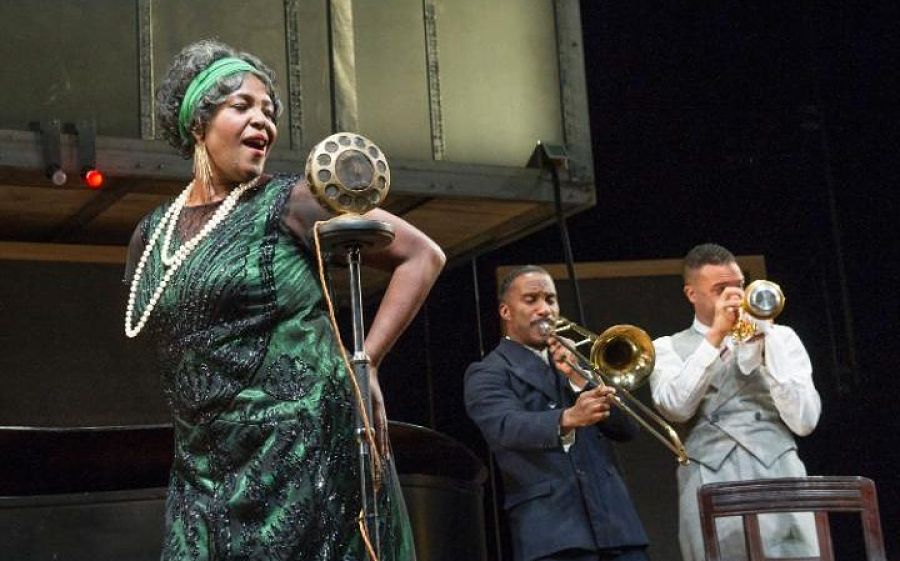
Just recently I traveled to London, where there was a production of Ma Rainey’s Black Bottom that a director by the name of Dominic Cooke directed, and it won the Olivier for Best Revival. That show just knocked me out. It was so good and exactly what I just said: reimagined. In London they don’t necessarily have as big a legacy as we have here in the U.S. of doing this work; I think most directors here either remember Lloyd Richards or they know the original versions down generations—we’re maybe three or four generations removed. At this point, I really want to invite new directors to really reimagine, re-envision, and see what the work tells us about 2016 and on.
I know there was some criticism when Bart Sher directed what I thought was a great production of Joe Turner’s Come and Gone on Broadway, because Sher is white. Have you felt any responsibility—or pressure—to make sure that August’s work is interpreted primarily or even exclusively by artists of color?
Yes. August had black directors during his lifetime, and he obviously really championed a black director with his movie of Fences; only now is it getting made with Denzel Washington, who is the perfect age and the perfect director for the project. So August really stepped up to champion a lot of black directors, and it felt important to him that the first Broadway productions of his plays be done by black directors. But he never gave the mandate of saying, “Only black directors can direct my work.” And obviously Dominic Cooke in London is not a black director. I don’t want to say that there are no black directors that should be doing his work; I think a lot of black directors should be doing his work. But at this point I think other people’s visions can be added to the conversation about August Wilson. You know, whatever you say about Bart Sher, good, bad, heinous, he added to this conversation about the production. I mean, what is this production of A View from the Bridge we just had on Broadway by Ivo van Hove, or The Crucible? What are they doing but adding to the conversation of what a classic work of theatre is? At this point I hope people are finding that August’s work is classic and can be done in many different ways.
Ma Rainey is set in a recording studio, so I could imagine it done in a less realistic way. A lot of his other plays, though, are set in houses and backyards, and seem to lend themselves to more naturalistic stagings.
But that was Lloyd Richard’s aesthetic.
Yeah, now that I think of it, a lot of the plays have supernatural elements, so…
Yes, and are they or are they not poetic?
Of course.
I mean, do you hear people next door speaking in the way that they speak in August Wilson’s plays?
I’d love that, but no.
No. August created a world that is full of poetry and full of metaphor and very much created mythologies that are in each play, from which the well never runs dry. I really think the sky’s the limit in terms of how they can be presented from now on.
Let me ask about the Fences film—that’s just the first of what’s going to be a series of films of the whole Century Cycle, right?
Okay, to get it straight, the story is this: The movie of Fences is a Paramount Pictures film produced by Scott Rudin. That is completely a different project than the HBO contract that we have. In fact, the estate has very little to do, if at all, with the movie, because I sold the rights to the movie a long time ago. I do get to go next week and visit the set for Fences, but it’s because I know Denzel—that’s the only reason. The contract with HBO is just for five of the nine plays that are left of August’s canon; after five we are going to renegotiate and see how our collaboration with HBO has gone.
How involved do you get in decisions about how his work is done—like, do you have people propose crazy things you have to turn down?
There have been a couple of offers where I just say, “Uh, I don’t think so.” Like a woman playing a man, and I say, “Are you sure? This is 1970, and within this world are we going to accept a woman playing a man’s role as a woman?” That kind of thing—casting questions.
Regarding casting questions, do you ever get people asking to cast his work with people other than African Americans—like, say, an all-Latino production of Jitney?
Well, actually, Joe Turner was translated to Spanish, and I speak Spanish, so I read it. And they did it with some Afro-Hispanic people at a small University in Colombia, which is the country I’m from.
Is that the only example like that?
No, in Beijing there was a Chinese production of Fences with Chinese actors doing Troy and Rose.
That reminds me of the story of Arthur Miller taking Death of a Salesman to Beijing, and he got the feedback, “How do you know Chinese people so well?”
That’s what people would say to August after they saw Fences here. There’s a famous story of a Polish man who came to August and said, “How did you know my father?”
I’ve never heard the story of why you and August chose to move to Seattle.
Well, I’m a West Coast girl, and I love to visit New York but I just cannot live here. So I wanted to go back to the West Coast, and it would have thrilled me if August said, “Let’s go to California.” I would have lived anywhere in California.
What part of California did you grow up in?
Central California and the Bay Area. I went to undergrad at UC Santa Cruz. But he did not want to go to California, so that left us basically with Oregon or Washington, Portland or Seattle. And we chose Seattle basically because it’s a much bigger, more metropolitan city, easier to get in and out of the airport. And when we got there, you know, it was rainy, and I had to go off and finish a show. So August stayed home in Seattle and he counted the days: He said to me, “30 days, 30 nights—all rainy.” But we basically said, “Okay, if we’re living in Seattle, we’re gonna just have to get used to it.” So we barbecued in the rain, we went out in the rain. He slowly but surely warmed up to it.
I read somewhere that when he first moved from Pittsburgh to St. Paul, there were comparatively fewer black folks around, and that isolation allowed him to hear the voices from his past more strongly. Did he feel that in Seattle as well? There are some black folks there but…
It’s not a hugely black town.
So do you think that the isolation helped him concentrate?
I think that, you know, he had this magic power in him, and a lot of artists have this, where they will work and create wherever they are. I think the way that August described his process was that he would hear his characters. And he had already formed his map of where he was going to write about; he always knew the street corners where he more or less placed the locations of every single one of his plays from his memory. There’s actually a critic of drama at the Pittsburgh Post-Gazette, Chris Rawson, who has done investigations according to the plays and pinpointed, more or less, where those locations would be, including Aunt Ester’s house. And within that landscape August could place his characters doing their things, having their lives in different decades, because it was so cemented in his mind as his birthplace.
When you met him in 1987, was he already thinking about a Century Cycle?
Yes, he already had. In fact, there was a New York Times article on that; I think he had written his first three, and he said, “Why not one for each decade?”
But it wasn’t until later, I don’t think, that he started to have the plays speak to each other and have characters recur.
Yes, that was later.
It wasn’t until Seven Guitars and King Hedley II, right?
There are two recurring characters in King Hedley II: Canewell, who by then has become Stool Pigeon, and Ruby, who we meet very young in Seven Guitars, who is King Hedley’s mother later. And Sterling from Two Trains Running reappears in Radio Golf.
I love talking about these characters like they’re real—because really, they are.
They are real, yes.
Do you have a favorite?
Character?
Character or play?
Oh my goodness. I have a special relationship with each one, but of course I have a very special relationship with The Piano Lesson because that’s how I met August. I also love Seven Guitars because it was the first play he did that while we were together, so I really saw it from its infancy. August was debating whether to call it Moon Goin’ Down or Seven Guitars. I remember when I convinced him to call it Seven Guitars, it was like his very first draft and it didn’t read like an August Wilson play, and that’s when I realized, “Oh my gosh, this is a baby play.”
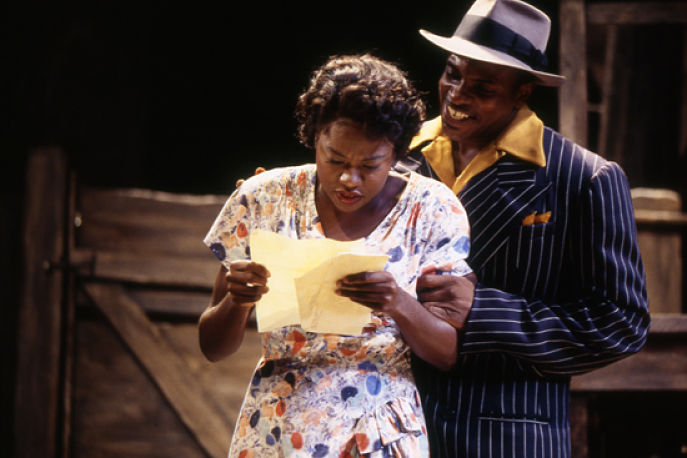
One thing he told me he was going to do when he was done with the Century Cycle was to go back and revisit his original inspiration for that play.
He was.
Seven Guitars II was going to have seven guitars onstage and have musicians fighting over which one belonged to whom—guys fighting over which corner they were gonna play on.
Yes. He wrote a few pages for that, but unfortunately not enough for it to be a play.
Did he struggle with some plays more than others?
Oh, gosh. What he said was that when he finished Joe Turner’s Come and Gone, he had to sit down and he just cried. He just felt like he had gone somewhere where no man’s been before, and having finished with the play he had to come back to being August Wilson. He felt like that was a real cleansing experience. Now, were some plays more easy to write than others? I think that it’s hard to say, because he became a better writer as time went on. I mean, Fences was five hours long when it was first read, and they had to get it down to three, which in today’s atmosphere is ridiculous, because every show is now 90 minutes, you know? But as he was writing, let’s say, King Hedley II, I don’t think that he necessarily had to write as much, because he had become more empowered as a theatre writer. He also had his own space. He said that while he wrote Fences he was sharing the kitchen table with his family, so if it was mealtime he had to take all his papers and put them aside. Can you imagine?
I heard that would also do exercises—John Lahr’s profile mentions that he would write standing up, with a boxing bag nearby. Is that true?
Yes. But it’s not necessarily quite like it sounds; he was not really a boxer. He did a few boxing moves, and he was a boxing fiend.
Was most of the rewriting processs for him about cutting? He was known for those long speeches.
No. You know what? One thing about August Wilson that a lot of young writers should know is that he was not precious. He really wasn’t. And he didn’t like people to say that his plays were wordy; he would say, “How does Shakespeare get away with it?” It’s like people are just not used to hearing black people talk about philosophy, talk about their dreams and their mythology, their relationships, you know? They’re just not used to that. How many plays like August Wilson’s were there out there when he was writing them?
So he would wrestle with that. But if what was called for was, “Shoot, we have to cut this cool scene out, because it’s not adding to the story of the whole,” then he would do it. I saw him cut a whole scene out of Seven Guitars, and I remember watching that scene for the last time before it went away and how much I enjoyed it; it was like saying goodbye to a little part of life, you know?
So there aren’t whole plays out there, but there’s some poetry and odds and ends, right?
There are. There’s a lot of poetry that I would like to publish. Universes is going to do a piece based on some of that poetry; we’re still working out what is that going to be. That’s an animal that has never been created before; I mean, they’re basically collaborating with August, who’s not here, on very private thoughts that we will never really get explained further. It has the mystery that is within poetry, which is really wild.
Stop me if this is a too personal question, but I wondered—he’s known so much for giving a voice to people, to black people, but did you ever feel like he was also, through his plays, working out something very personal about himself and his life?
Oh, of course.
I mean, all playwrights do.
All playwrights do. But you know, people would ask him after every single play, for example, Did you ever know a boxer? Did you ever know an old baseball player? Did you ever know a musician? People would always want to fish out if there was a secret to August’s inventions. And there really wasn’t. He was just somebody with a large imagination who grew up hearing a lot of old people talking. But he took that and elevated it to a different place. So I think some characters do speak about August and some of his personal struggles or his experiences, but not so much so that we could say, “This character is August.”
Yeah, I never got a sense watching his plays, “Oh, that’s the August Wilson stand-in.”
No. A part of him is in every single character, including the women. Or it’s his mother.
I’ve read that though he finished those 10 plays, he hoped and planned to do more until he got sick. I mean, he did so much, gave us so much, that to be sad that there wasn’t more seems ungrateful, but still….
I know. I think to know all of the plays is to want more. But what I want people to know is that he was working on his next play before he died. People say, “He finished,” and I get a little sad when I hear that, because he had so much more to give. He had a novel that he was working on.
I didn’t know that.
Yeah, and he had a play he was working on outside the American Century Cycle.
I don’t think I’ve heard it called the American Century Cycle that often.
I’ve had an uphill battle with that. Some people want to call it the Pittsburgh Cycle…
Well, Ma Rainey is not set in Pittsburgh, for one thing.
Exactly. And the reason I’m saying this, and I’m going to push it harder so this will become a brand, is because these stories belong to all Americans.
So you’re saying that you want to insist on calling it the American Century Cycle?
Yeah, the American Century Cycle.
Not the African American Century Cycle…
No.
And not the August Wilson cycle…
Exactly. Because, you know, what is August Wilson at this point but a great American playwright?
One of the greatest.
Let’s not confuse it by saying “Great African American Playwright.” He’s a great American playwright. These plays belong to all America. It’s been proven by the August Wilson Monologue Competition. And when I go to London, what do they say to me but, “Oh, you are August Wilson’s wife? He is the American Shakespeare.” I hear that from London actors. They adore August.
Can I ask you, did people talk this way when he was alive? And if so, did that kind of adulation ever go to his head? Or was he like, “Don’t talk about greatness, I’ve got work to do”?
As with everything, it’s a very complicated answer to that question. He was a very humble man; he had simple tastes. He was very generous with young people or anybody who approached him. You know, when I saw him with a group of people he would say hello to everyone who wanted to say hello—and much to my distress sometimes, because I was the one waiting for him. But in terms of what was owed to his efforts, if he went into a theatre and he saw that somebody there had not done their work, he would get furious, because, you know, he felt: I’ve done my work. He could stand by his work and say, “I’ve worked on this and I’ve worked my butt off.” So he had very little patience for people who didn’t give their best. And, you know, at times that might have been interpreted as being huffy or…
He was confident.
Exactly, and if somebody disrespected his work or the work of other playwrights, he would say, “Nobody works until the playwright touches pen to paper.” You know?
It’s also true that along with all the acclaim there has been a persistent thread of criticism, and I think August had some reason to feel undervalued in some quarters. I’m not just talking about Robert Brustein, though he was among the leaders of the opposition.
Yeah.
But of course one mark of a great playwright is not just that his work is done and loved but that people still argue about it.
Yes, of course.
We don’t just put it on a pedestal and worship it, but reinterpret it and wrestle with it.
Right, and it creates conversation and it creates critiques and people come back and say, “I want to dispute that critique.” I think that is the mark of a good piece of art, whatever the genre.
Yeah, and it’s okay to say that some of his plays are better than some of his other plays and then talk about why, right?
Yeah, and some people dispute that.
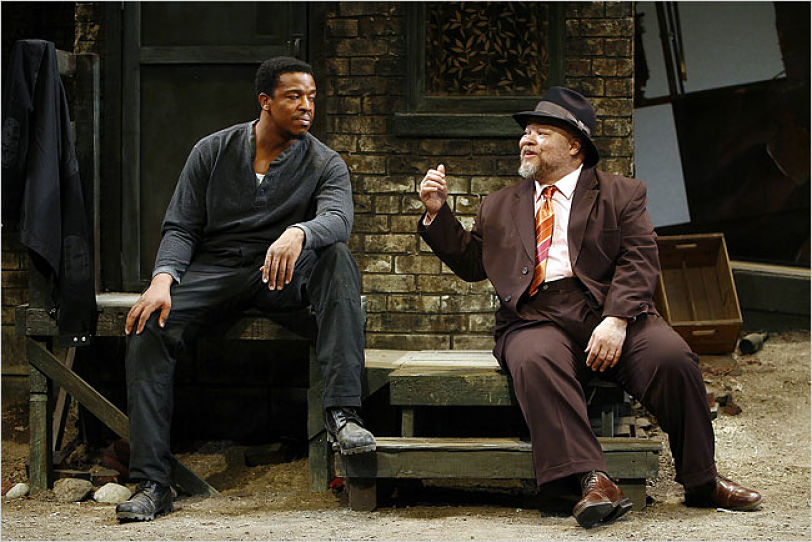
Yeah, exactly. I know King Hedley II—I think we all dismissed it at the time.
I happen to love King Hedley.
I was talking to Branden Dirden and his wife, Crystal Dickinson…
Yes, I love them.
And they were telling me about how that play had been reclaimed in the Signature production, and that they think that play is one of the greats and needs to be reevaluated. And I said, “Okay, I’ll take another look,” because I didn’t like it very much at the Taper when I first saw it.
It’s a very difficult play to direct and act in because it’s so epic, and so dark.
Joe Turner is my favorite, and it was so moving to hear you talk about what that meant to him, because that play does feel like a real turning point in his writing.
It really does break ground, doesn’t it?
It creates a whole world unto itself. I’m just in awe of that one.
So am I. It’s an amazing legacy, and to be able to be as close as I am to his work and to be able to represent it and talk about it with directors or actors, and with someone like you, who knows his plays so well, I always get excited.
You don’t tire of it.
I don’t. Somebody asked me yesterday: Where does August’s work end and your artistic voice begin? And of course I still do a lot of my own costume work and designs, but I think that in representing his estate, I’m still being creative. I’m still using my imagination, and by helping some directors get to do these shows, and for them to enter into conversation, that’s still a very creative place to stand.

